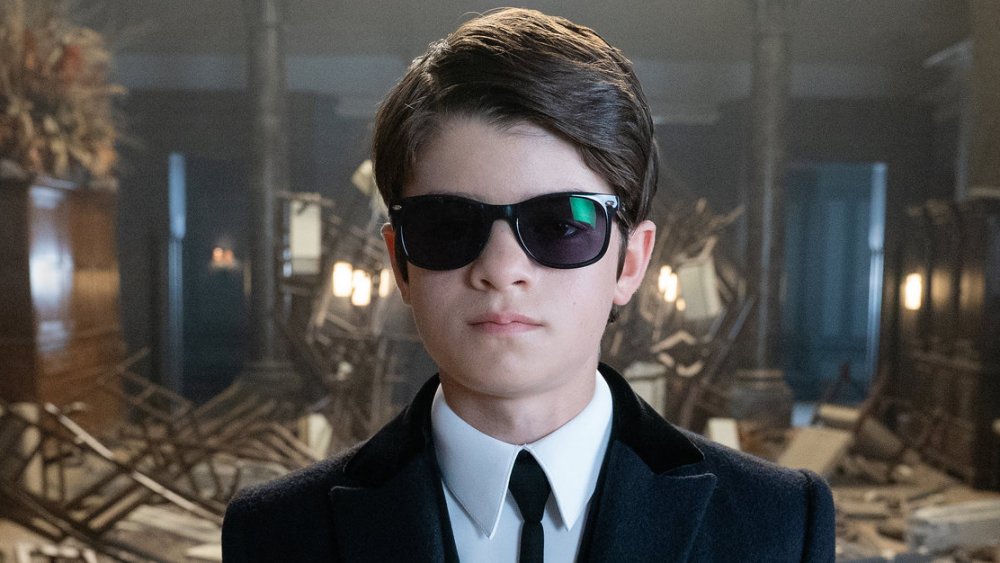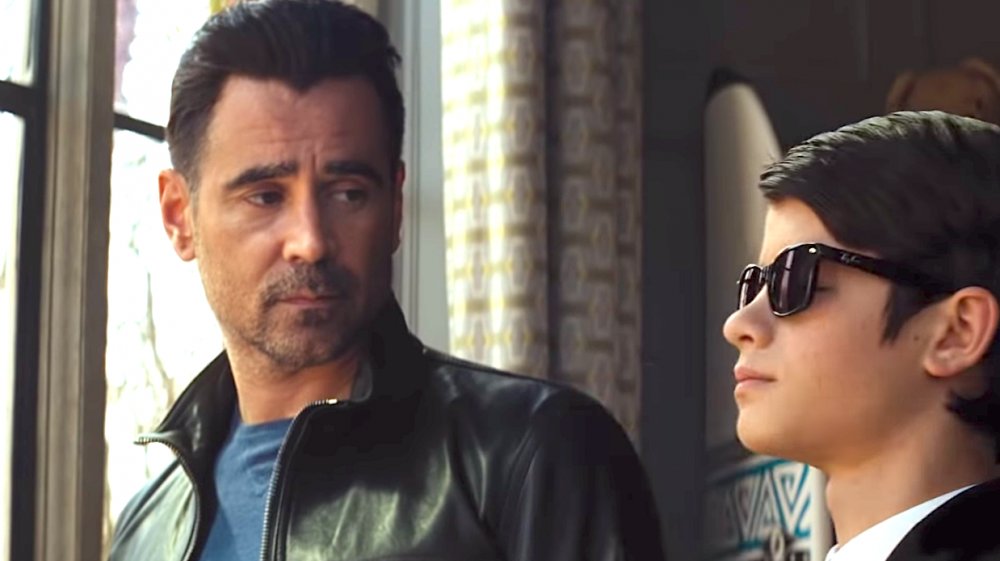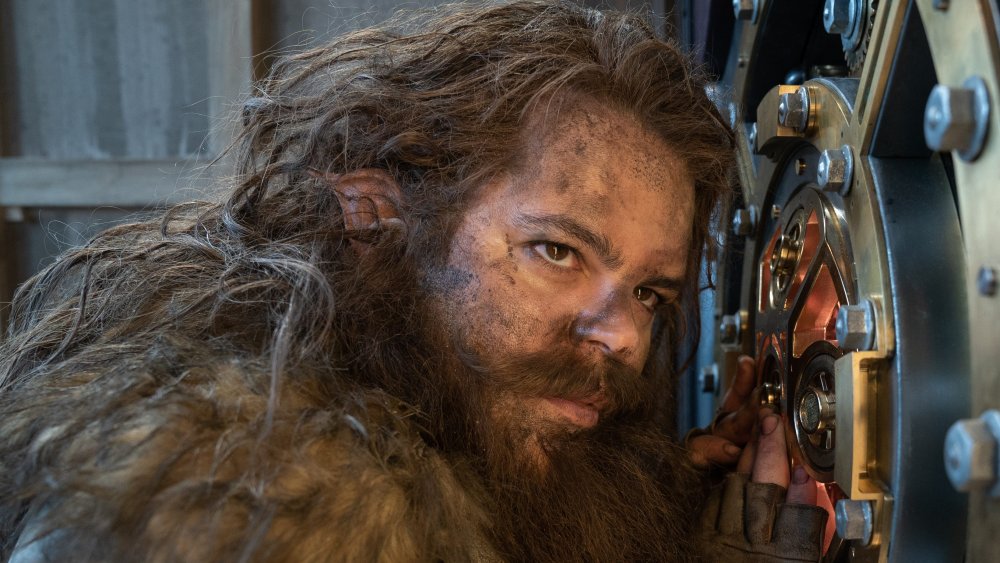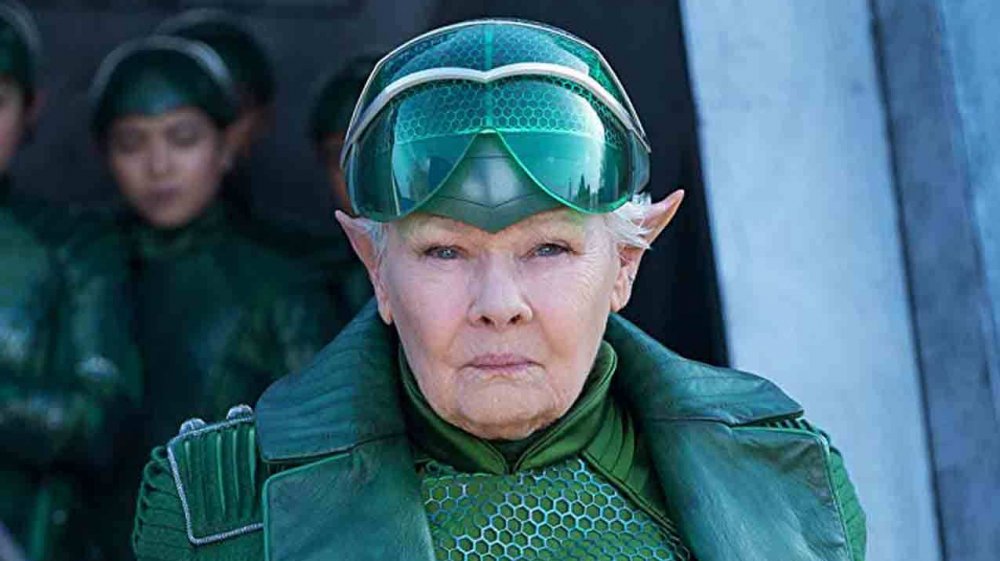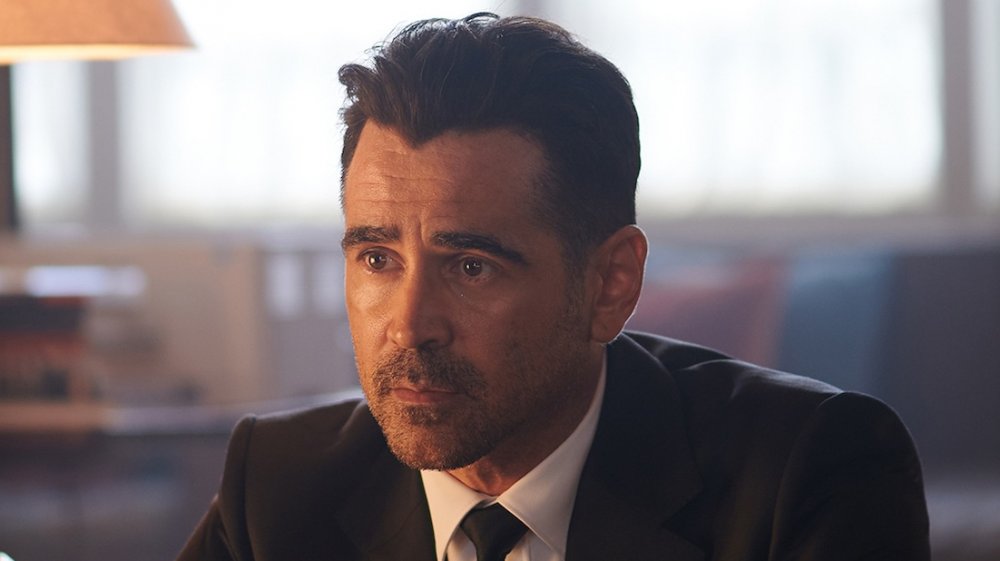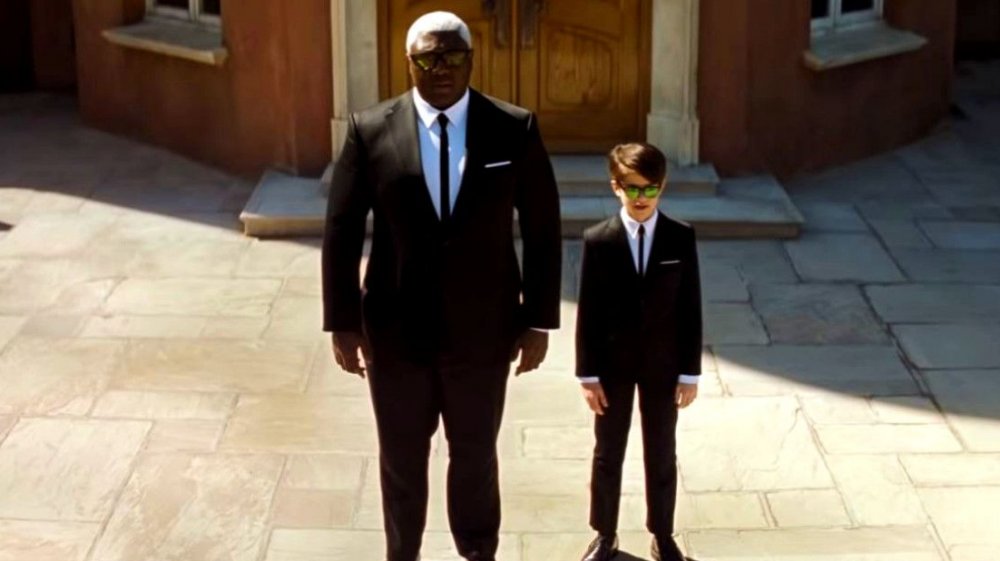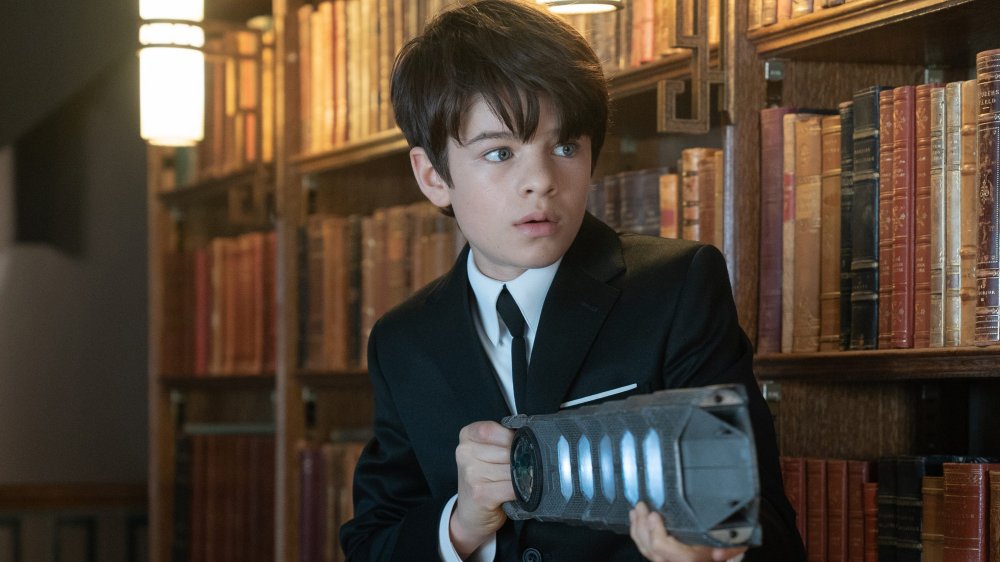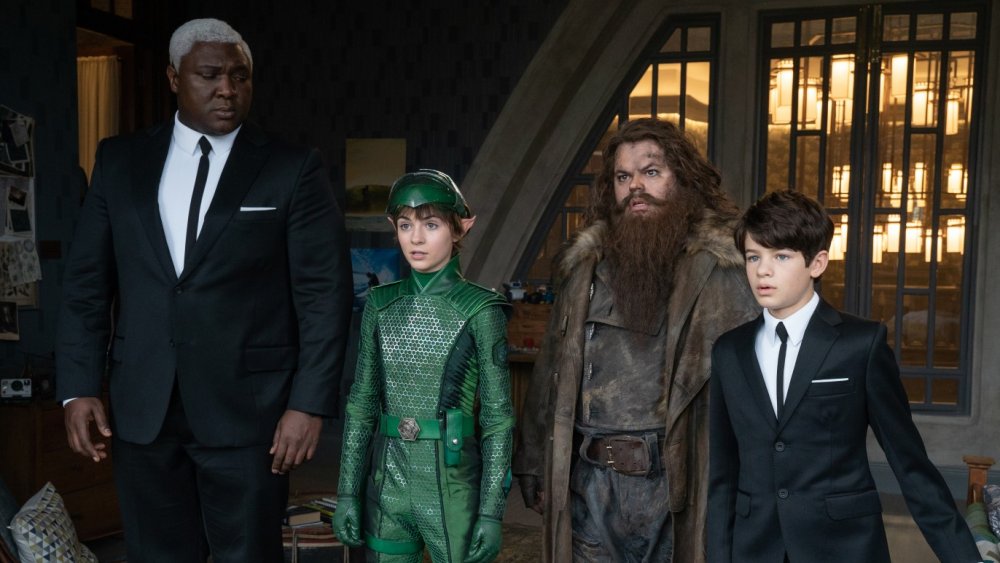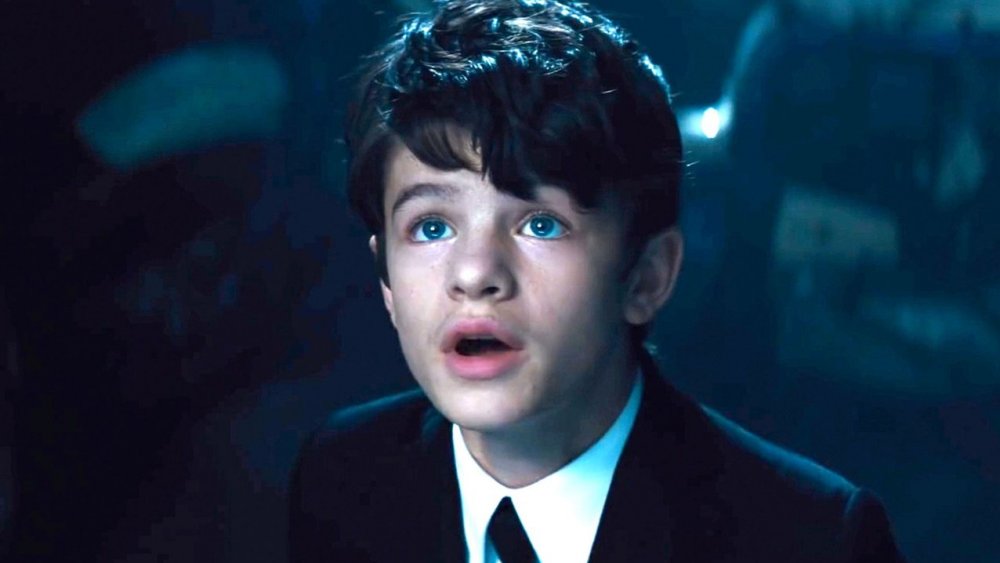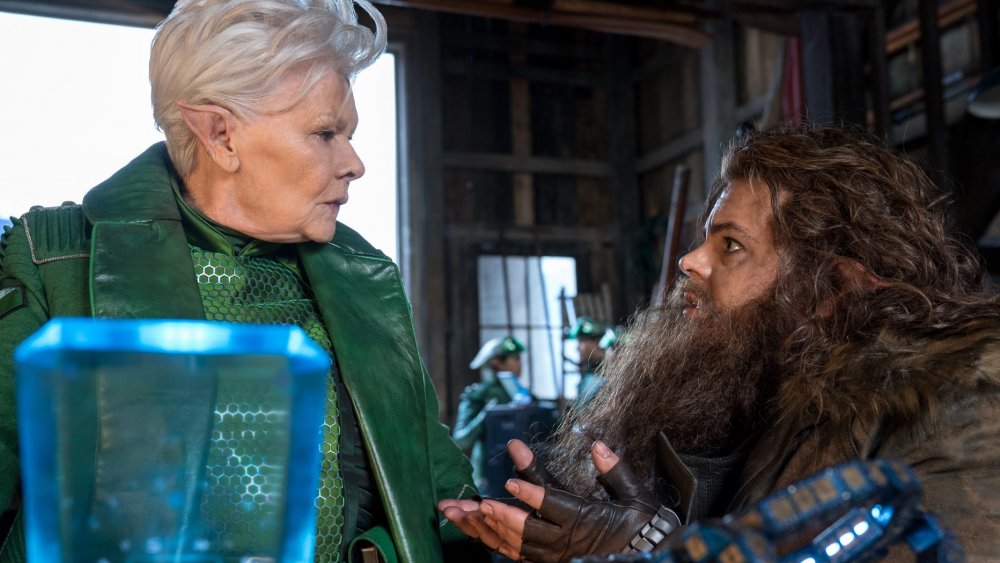Things Only Adults Notice In Artemis Fowl
After two decades, the wait is finally over: The film adaptation of Eoin Colfer's Artemis Fowl has arrived. Hitting the Disney Plus streaming service in June 2020, the big-budget movie version of the first part of the fantasy saga (with hefty doses of crime, espionage, family drama, and science fiction) can be a fun watch whether or not you've read the books, and for kids of most any age as well as dutiful parents who want to see what all the fuss over the years has been about.
The plot: Internationally known master thief (and Irish folklore expert) Artemis Fowl I (Colin Farrell) has gone missing, and it's up to his shrewd genius son, Artemis Fowl II (Ferdia Shaw), to rescue him from the revenge-minded magical creatures who kidnapped him. It's a task that's going to involve all kinds of fantastical beings, particularly the tough as nails fairies of the LEPrecon organization.
Artemis Fowl is a movie for kids, but it's a complicated one with lots going on. There's something for everyone, even adults, who will see the movie from a completely different angle. These are the things only adults notice in Artemis Fowl.
Who's watching the kid?
Artemis Fowl is empowered to do the amazing things he does through a lack of adult supervision. There aren't any parents around to tell him to be home by nine, or to not wage violent war against an army of magical creatures. As is the case with many literary and movie heroes who are also children, Artemis Fowl's parents are noticeably and alarmingly absent. The poor kid's beloved mother is long dead before the events of the movie take place, while his father's absence — prompted by his kidnapping at the hands of a vindictive fairy queen — is the main plot of Artemis Fowl, although it's stated that Artemis Fowl Sr. frequently leaves home for long stretches of time, much to Artemis Fowl Jr.'s resentment and annoyance. In other words, young Artemis is being raised by a largely absent single parent. Adults who watch Artemis Fowl will wonder who's looking after this kid — a high-maintenance job, what with his genius level abilities and needs. Sure, there's his butler in Domovoi Butler, but he seems to be more of an adventure cohort than a parental figure who does things like take Artemis to school or make him a meal.
This narrator is questionable at best
One of the highlights of the Artemis Fowl adaptation is Josh Gad as a witty career criminal dwarf named Mulch Diggums. The character serves as both audience surrogate and narrator, explaining the film's elaborate and nuanced fantasy world for newbies, while also participating in the story itself. The role of arch narrator is familiar territory for Gad — he often plays quirky characters who lay things out for viewers, like in A Dog's Purpose and on Central Park. Older viewers will appreciate that, but otherwise, Gad's character is a problematic narrator, plot-wise. Much of the story is told via interrogation, and much of the story does not involve Mulch Diggums at all. How does he know the ins and outs of a complicated story that he didn't witness firsthand? He certainly wasn't in the room for those tender moments between Artemis Fowl senior and junior, for example. This realization could make a savvy viewer question the entire movie — is the narrator just making stuff up as he goes along?
This all feels quite familiar
Eoin Colfer's first (of eight) books in the Artemis Fowl series hit bookstores in 2001, during a "young adult" craze in publishing that made other tales of dark adventure starring kid and teen protagonists into blockbuster hits. Among those phenomena: Harry Potter, The Hunger Games, Twilight, The Maze Runner, and Divergent. Hollywood struck while the proverbial iron was hot, turning all those titles and more into movies as quickly as possible. But it took Artemis Fowl nearly 20 years to jump from page to screen, and the result is a film that would appear, to adults who have seen a few other YA adaptations in their day, dated and trite.
So many elements of the film feel like well-worn territory at this point, if not lifted whole cloth from other, earlier films. Josh Gad's character, Mulch Diggums, bears a striking if not trademark-violating resemblance to Robbie Coltrane's half-giant gamekeeper Hagrid from the Harry Potter movies. Young Artemis Fowl dresses in a dark suit and sunglasses and adopts a nonchalant attitude, which is straight out of Men of Black. The mysteriously hooded villains seem to have stepped right out of Star Wars, while the huge war between multiple magical races is very much a Lord of the Rings thing. And then there's Judi Dench, who plays a powerful governmental figure, not unlike the character she's played in so many James Bond films.
It's probably not a good idea to tell people you're a criminal mastermind
The whole deal with Artemis Fowl Sr. (Colin Farrell) in Artemis Fowl is that he's a "criminal mastermind." (Various characters call him that several times.) Kid viewers will absorb that bit of information and move on, but older watchers may find that description to be baffling. If the elder Artemis Fowl were truly a master of crime, that would mean he'd gotten away with his crimes and would thus be anonymous. Further, to proudly call oneself a criminal mastermind only arouses suspicion of the authorities and the threat of legal punishment. And yet the Fowls live in a beautiful and gigantic home in Ireland, a famous residence known far and wide as Fowl Manor. He's a known criminal and yet remains untouchable, somehow.
Perhaps that's because Fowl Sr. doesn't know what to do with the priceless historical artifacts he famously swipes. If he sold them or tried to display them publicly, that would surely lead to his demise. That only brings up more questions, then — like how are the Fowls that wealthy?
There's some uncomfortable racial politics in Artemis Fowl
Artemis Fowl is about a clashing of races. Fairies, elves, goblins, trolls, and other magical beings factor into the film, but adults watching just might notice an uncomfortable racial dynamic among the human characters. Young Artemis Fowl's chief cohort and collaborator in his adventures is Domovoi Butler. In Eoin Colfer's Artemis Fowl books, the character is of a Eurasian background, but in the Artemis Fowl film, African actor Nonso Anozie landed the part, thus creating a relationship of servitude between a character who is white (Artemis) and one who is a person of color. There aren't many non-white people in the movie anyway, and the most prominent one is servant, and one who (spoiler alert) dies nobly and proudly while seeing to the wishes of his white child boss. It makes for awkward viewing, to say the least.
The name "Artemis" has some meaning
One of the first and most noticeable things about Artemis Fowl is his first name. If it sounds vaguely familiar to grown-up viewers, it should, because it's the name of a figure from the pantheon of gods they learned about during that unit in junior high on Ancient Greek mythology. In that rich and complex belief system that formed the basis for so much of the western literary tradition, Artemis wasn't a tween boy but an adult goddess, the deity ascribed to the hunt, wild animals, and vegetation. (Lineage-wise, she was Apollo's twin sister and the daughter of Leto and the mighty Zeus.) All of this makes adults watching Artemis Fowl wonder why the source novel's author, Eoin Colfer, chose that name for his main character. There are a few parallels that may come to mind while sitting through one of the movie's many endless action sequences. As Artemis kept tabs on wild creatures, Artemis Fowl keeps tabs on wild creatures, and spends the bulk of Artemis Fowl on the hunt for his father, headquartered in his palatial estate amidst the natural wonders of the Irish countryside. Beyond that, the boy's intellectual capabilities are said to be so impressive as to be almost... god-like.
An innocent man was definitely killed
War is a horrible thing for everyone involved, and even children know this. But what they may not realize — while adults do — is that the collateral damage of any armed conflict is bound to include the loss of innocent lives. The big fight between Artemis Fowl (and his human contingent) and the magical creatures led by LEPrecon in Artemis Fowl is no exception, and, like a real-life war, their actions lead to callous and brazen destruction of life and property for those who have nothing to do with this epic battle. Utilizing some advanced magical technology, LEPrecon officers throw a time freeze over Fowl Manor. Looking like a giant translucent bubble, it renders those inside powerless sitting ducks. In the heat of the struggle and the destructive setup of the time freeze, it encompasses part of the Irish coastline where Fowl Manor sits. It creates a miniature sea storm, throwing a small fishing boat and its contents — including a local fisherman — into the air. When that time freeze is deactivated, all that is going to come down hard. That boat is destroyed, and the fisherman likely died in the fracas.
Kids grow up so fast these days
The non-juvenile audience for Artemis Fowl is necessarily going to include a lot of parents. Coronavirus-related restrictions made a 2020 theatrical release impossible, so the film debuted on the family-friendly Disney Plus streaming service, where it's certain to be a family movie night selection that kids and adults can agree on, particularly fans of the Artemis Fowl books and viewers who enjoy fantasy films and action movies. By virtue of bringing life into the world and shepherding it to adulthood, parents notice things that non-breeding adults (and kids) don't notice, such as how kids grow and change relatively rapidly. To that end, Artemis Fowl's titular star, Ferdia Shaw, grows up before viewers' eyes. In some scenes, Shaw appears pint-sized and babyfaced, while in others he looks like a tween in the early stages of adolescence, and in still other sections of the film, he seems to be a teenager. Of course, Artemis Fowl, like nearly all films, was not shot in sequential order, meaning Shaw looks completely different from one scene to the next. In a five-minute segment, he may go from older to younger to not quite as old, then back to little once more.
There's a lot of "fowl" language
There isn't a lot of humor in Artemis Fowl. What is there is provided by narrator and self-professed extra-large dwarf (meaning human-sized) Mulch Diggums. That name is in and of itself a joke that pays off well into the film, when the audience learns that the character possesses a superhuman level ability to tunnel through the earth — or rather "dig" through things like "mulch." Many other character names in Artemis Fowl are a source of levity, ranging from the subtle to the obvious. Holly Short is an elf by nature, a species generally depicted to be of small stature... or short. Adding another layer, Holly is a commodore in the paramilitary Reconnaissance force called LEPRecon. Adults will probably also chuckle at how Artemis Fowl is served by Domovoi Butler — a butler named Butler — in his affairs at Fowl Manner. The name of the home suggests a character trait of the smug, entitled, arrogant main character: Artemis Fowl of Fowl Manner is himself foul-mannered.
As for actual "fowl language," or the kind of jokes that would sail over kids' heads, there's one big one that must allude to something dirty. During a negotiation with Commander Julius, Mulch Diggums comments that the two of them are "grunting at each other like a pair of hippos with a throat infection."
Artemis Fowl reveals the truth about David Bowie
As opposed to most kids' movies released in the last couple of decades, Artemis Fowl is almost completely devoid of cheap, easy, and pointless pop culture references. Refreshingly, nobody dabs, or sings last year's song of the summer, uses an emoji, or mentions Facebook. Artemis Fowl is concerned with the action at hand, and that has more to do with history, and the thousands of years of fighting between humans and fairies, than it does with the present and the frivolities of the world. That said, there are a couple of jokes about rock stars of the late 20th century. When large dwarf Mulch Diggums (Josh Gad) sits in prison, he passes the time by listening to tunes on a music box he stole from Holly Short. He rocks out to Foreigner's 1984 power ballad "I Want to Know What Love Is," annoying a cellmate. "You seem like more of a 'glam' guy," Diggums retorts to a guy whose speaking voice sounds just like that of glam rock pioneer David Bowie. And in conversing with fairy commander Julius Root (Judi Dench), Mulch remarks, "You're like David Bowie if David Bowie were a fairy, so, essentially, you're David Bowie." Adding to the joke, Mulch identifies Bowie as the magical creature millions believed he was. "Do you think the humans will ever find out he was one of us?" he asks, rhetorically.
